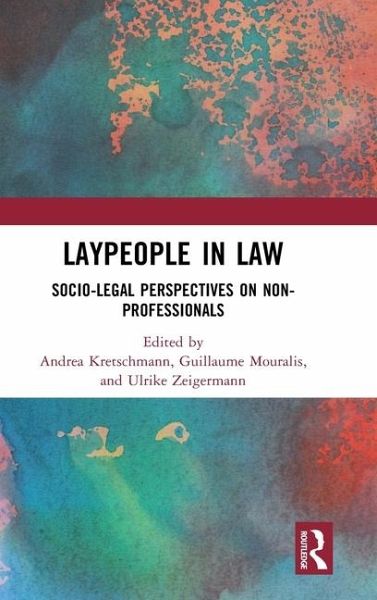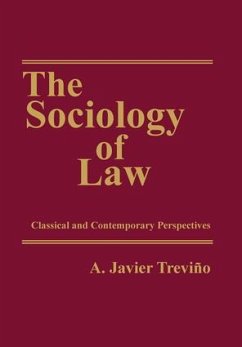
Laypeople in Law
Socio-Legal Perspectives on Non-Professionals
Herausgegeben: Kretschmann, Andrea; Mouralis, Guillaume; Zeigermann, Ulrike
Versandkostenfrei!
Versandfertig in 6-10 Tagen
154,99 €
inkl. MwSt.

PAYBACK Punkte
77 °P sammeln!
This book contributes to a better understanding of the role laypeople hold in the social functioning of law.It adopts the scholarly insight that the law is unthinkable without an everyday legal understanding of the law pursued by laypeople. It engages with the assumption that not only the law's existence but also its development is shaped by the layperson's affirmations, oppositions, ignorance, or negations of the law. This volume thus aims to fill a void in socio-legal studies. Whereas many sociolegal theories tend to conceptualize the law through legal experts' actions, institutions, procedu...
This book contributes to a better understanding of the role laypeople hold in the social functioning of law.
It adopts the scholarly insight that the law is unthinkable without an everyday legal understanding of the law pursued by laypeople. It engages with the assumption that not only the law's existence but also its development is shaped by the layperson's affirmations, oppositions, ignorance, or negations of the law. This volume thus aims to fill a void in socio-legal studies. Whereas many sociolegal theories tend to conceptualize the law through legal experts' actions, institutions, procedures, and codifications, it argues that such a viewpoint underestimates the role of laypeople in the law's processing and advocates for a strengthened conceptual place in socio-legal theory.
This book will appeal to socio-legal scholars and sociologists (of law), as well as to legal practitioners and laypersons themselves.
It adopts the scholarly insight that the law is unthinkable without an everyday legal understanding of the law pursued by laypeople. It engages with the assumption that not only the law's existence but also its development is shaped by the layperson's affirmations, oppositions, ignorance, or negations of the law. This volume thus aims to fill a void in socio-legal studies. Whereas many sociolegal theories tend to conceptualize the law through legal experts' actions, institutions, procedures, and codifications, it argues that such a viewpoint underestimates the role of laypeople in the law's processing and advocates for a strengthened conceptual place in socio-legal theory.
This book will appeal to socio-legal scholars and sociologists (of law), as well as to legal practitioners and laypersons themselves.














